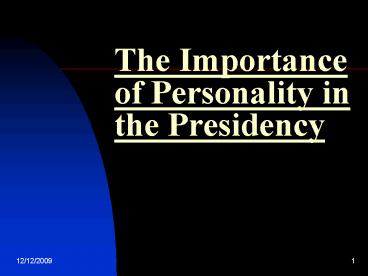The Importance of Personality in the Presidency - PowerPoint PPT Presentation
1 / 18
Title:
The Importance of Personality in the Presidency
Description:
One of the ideas Polsby and Wildavsky stressed in Presidential ... Passive-negatives: Eisenhower and Coolidge. Passive-positives: Harding, Taft, and Clinton ... – PowerPoint PPT presentation
Number of Views:22
Avg rating:3.0/5.0
Title: The Importance of Personality in the Presidency
1
The Importance of Personality in the Presidency
2
Introduction
- One of the ideas Polsby and Wildavsky stressed in
Presidential Elections was the importance of
developing an image. An important aspect of
developing an image is allowing the voters to
know who you areyour personality.
3
In addition, in a deliberative democracy
the president is supposed to provide the energy,
the ideas, while Congress is supposed to provide
the deliberative brake. The ability of the
president to provide that energy often is a
function of personality.
4
And the difference between Clinton Rossiters
and Edwin Corwins roles of the president owes a
lot to differences in presidential personality.
5
So what are we talking about when we talk about
personality
- Gordon Allport wrote that personality is the
relatively enduring qualities observed in the
behavior of individuals and which are believed to
play a major role in determining that behavior.
6
And James David Barbers work, is based on
several psychological motivations or drives
- Need for achievement
- Need for power
- Need for affiliation
7
Using these motives he classified presidents by
style types
8
- Active-positives Kennedy, Carter, Ford, Truman,
Reagan, FDR - Active-negatives LBJ, Wilson, Hoover, Wilson
- Passive-negatives Eisenhower and Coolidge
- Passive-positives Harding, Taft, and Clinton
9
Hargrove divides presidents into two main
categories.
- Whig presidents
- Active presidents
10
Whig Presidents
- Lack desire for personal power
- Have fewer political skills
- Favor order, logic, regularity
- Are skeptical of government action
- Have not made important contributions to the
presidency
11
Active Presidents
- Are driven by need for personal power
- Are able to influence others
- Have a sense of purpose
- Are favored by the times
- Have strengths that also are their weaknesses
- Made unique contributions to the office based on
their personality
12
Fred Greenstein focused on situations where
personality becomes important
- Style and imagery
- More demanding acts
- Spontaneous behavior
13
- Ambiguous situations
- Lack of personal rigidity
- Intense impulse
- Lack of sanctions attached to alternatives
- Visibility reduces variation
- The more emotionally involved, the more personal
characteristics will affect behavior - Where situation is free from expectations of
fixed content
14
In the article, he talks about the modern
presidency, which has changed in four ways
15
And then there is Skowroneks typology
16
What all agree on is that personality plays a
role in the conduct and success of the
presidential office.
17
But there are problems with personality analysis
- Validity of inferences about childhood
experiences - Situational constraints
- Limitations imposed by role expectations
- Methodological difficulties
- Political orientation
18
Taken by and large the history of the Presidency
is a history of aggrandizement, but the story is
a highly discontinuous onethat is to say what
the presidency is at any particular moment
depends in important measure on who is
presidentYet the accumulated tradition of the
office is also of great importance. Precedents
established by a forceful or politically
successful personality in the office are
available to less gifted successors. Edwin
Corwin































